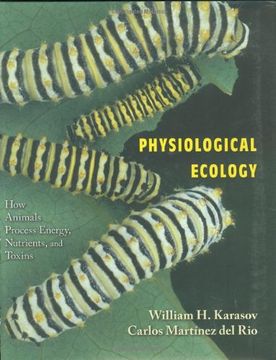Compartir
Physiological Ecology: How Animals Process Energy, Nutrients, and Toxins (en Inglés)
William H. Karasov; Carlos MartÍNez Del Rio (Autor)
·
Princeton University Press
· Tapa Dura
Physiological Ecology: How Animals Process Energy, Nutrients, and Toxins (en Inglés) - William H. Karasov; Carlos MartÍNez Del Rio
$ 121.05
$ 164.29
Ahorras: $ 43.23
Elige la lista en la que quieres agregar tu producto o crea una nueva lista
✓ Producto agregado correctamente a la lista de deseos.
Ir a Mis ListasSe enviará desde nuestra bodega entre el
Lunes 27 de Mayo y el
Martes 28 de Mayo.
Lo recibirás en cualquier lugar de Estados Unidos entre 1 y 3 días hábiles luego del envío.
Reseña del libro "Physiological Ecology: How Animals Process Energy, Nutrients, and Toxins (en Inglés)"
Unlocking the puzzle of how animals behave and how they interact with their environments is impossible without understanding the physiological processes that determine their use of food resources. But long overdue is a user-friendly introduction to the subject that systematically bridges the gap between physiology and ecology. Ecologists--for whom such knowledge can help clarify the consequences of global climate change, the biodiversity crisis, and pollution--often find themselves wading through an unwieldy, technically top-heavy literature. Here, William Karasov and Carlos Martínez del Rio present the first accessible and authoritative one-volume overview of the physiological and biochemical principles that shape how animals procure energy and nutrients and free themselves of toxins--and how this relates to broader ecological phenomena. After introducing primary concepts, the authors review the chemical ecology of food, and then discuss how animals digest and process food. Their broad view includes symbioses and extends even to ecosystem phenomena such as ecological stochiometry and toxicant biomagnification. They introduce key methods and illustrate principles with wide-ranging vertebrate and invertebrate examples. Uniquely, they also link the physiological mechanisms of resource use with ecological phenomena such as how and why animals choose what they eat and how they participate in the exchange of energy and materials in their biological communities. Thoroughly up-to-date and pointing the way to future research, Physiological Ecology is an essential new source for upper-level undergraduate and graduate students-and an ideal synthesis for professionals. The most accessible introduction to the physiological and biochemical principles that shape how animals use resources Unique in linking the physiological mechanisms of resource use with ecological phenomena An essential resource for upper-level undergraduate and graduate students An ideal overview for researchers
- 0% (0)
- 0% (0)
- 0% (0)
- 0% (0)
- 0% (0)
Todos los libros de nuestro catálogo son Originales.
El libro está escrito en Inglés.
La encuadernación de esta edición es Tapa Dura.
✓ Producto agregado correctamente al carro, Ir a Pagar.

